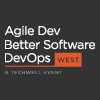Agile Dev, Better Software & DevOps Conference West 2016

PRESENTATIONS
|
A Case Study in Metrics-Driven DevOps
It seems impossible for a DevOps team to even attempt planning its work. The team deals with customers’ never-ending requests and constantly-changing priorities. And don’t forget those unfriendly infrastructure errors that always seem to show up at the worst possible time. Best to live... |

Ben Vining |
|
A Simple Tool for Speaking Honestly and Constructively
Are you on a team where people avoid conflict or shy away from saying anything that might sound critical? Reluctance to speak up can block important challenges from being identified, and deny your team and organization the opportunity to learn and improve. According to Lorraine Aguilar... |

Lorraine Aguilar |
|
Agile Hacks: Creative Solutions for Common Agile Issues
Whether you are just starting agile or have already made the transition to using agile in your organization, you may face the issues that Susan McNamara describes. Is your team not firing on all cylinders? Do people feel stuck or bored? Is your team having trouble getting to Done at the... |

Susan McNamara |
|
Agile Metrics: Measuring Outcomes and Results
When organizations move to agile approaches, two very common metric anti-patterns surface: (1) The organization doesn’t change its metrics at all and simply continues to measure as they always have; or (2) The organization throws out every metric and just focuses on velocity and trying to... |

Bob Galen |
|
Apply Phil Jackson’s Coaching Principles to Build Better Agile Teams
Often referred to as the “Zen Master” for his unorthodox coaching style, professional basketball coach Phil Jackson won more professional sports championships than any other coach in history. Jackson led the Chicago Bulls and Los Angeles Lakers to a total of eleven NBA championships, but... |
|
|
Architecture vs. Design in Agile: What’s the Right Answer?
Is architecture the same as preliminary design in agile? It shouldn't be. Do we create architecture up front, then do iterative development after the architecture is done? That is edging back toward waterfall. Can you explain the purpose of the architecture in just two or three statements? |

Anthony Crain |
|
Blending Product Discovery and Product Delivery
More and more organizations are realizing that while they are getting more done, they are not necessarily getting more value. More code does not mean more product and more product does not mean more market share. According to David Hussman, we need to shift our focus toward a... |

David Hussman |
|
Building Mob Programming Teams Using Lego® Serious Play®
In recent years the idea of Mob Programming has begun to attract the attention of those looking for new ways to take advantage of the genius that can be found in a focused, cross-functional, and unified agile team. But how, in practice, do these teams actually work? Paul Wynia, a Lego®... |

Paul Wynia |
|
Command Query Responsibility Segregation at Enterprise Scale
As organizations grow, they find themselves looking for opportunities to enhance the rate at which features can be delivered while minimizing negative business impact. Carlyle Davis believes that we are responsible for creating an system environment that provides simplicity and resiliency... |

Carlyle Davis |
|
Continuous Discovery: The Path to Learning and Growing
Software development is a process of continuous discovery. When writing software, we create ideas, we try them in code, we learn what works and what doesn’t—and that steers us to a better solution. And sometimes we do this all day long! Woody Zuill says that this same process of continuous... |

Woody Zuill |


